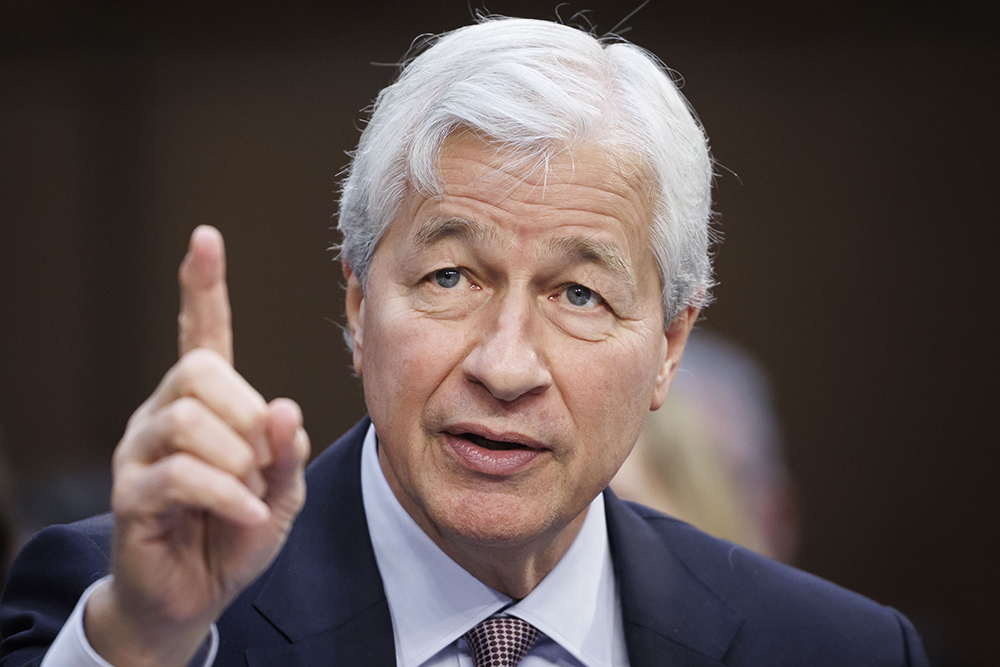
摩根大通(JPMorgan Chase)的首席执行官杰米·戴蒙再次表示不会再谈论比特币(Bitcoin)。
在瑞士达沃斯接受美国消费者新闻与商业频道(CNBC)采访时,戴蒙明显认为主持人的问题可笑。他宣称,他发誓再也不会就加密货币发表意见。在被问到上周获得美国证券交易委员会(Securities and Exchange Commission)批准的新比特币交易所交易基金(Bitcoin ETF)时,戴蒙打断了美国消费者新闻与商业频道的主持人和《纽约时报》(New York Times)的专栏作家安德鲁·罗斯·索金的话。
他在演播室主持人索金、乔·凯尔宁和贝基·奎克的笑声中说道:“有一件事情很重要,那就是这将是我最后一次在美国消费者新闻与商业频道谈论这个话题——我发誓。”
这种恼怒的态度,已经成为戴蒙谈论比特币时的标志性立场。他早在2017年就曾经表示,再也不会谈论比特币。
戴蒙继续批评比特币,称“它一无是处”。
他说:“我愿意称它是宠物石。”
然后戴蒙纠正自己的话,说他认为比特币实际上有一些用处。他指出,比特币能够用于各种非法用途,例如洗钱、欺诈、偷税或者支付嫖资等。
有证据可以支持戴蒙的说法。美国政府问责署(Government Accountability Office)发现,在其2021年6月的报告调查的27个商业色情网站中,有15个网站接受数字货币支付。此外,联合国(U.N.)警告,加密货币平台经常被东南亚的犯罪集团用于洗钱。
尽管有这些担忧,加密货币市场在经历了2022年濒临崩溃的“加密货币寒冬”之后,最近几年的表现一直非常强劲。2023年,整个加密货币行业的市值增长了95%,尽管其规模依旧比新冠疫情期间的史上最高点低35%。美国证券交易委员会最近批准的交易所交易基金也是一个信号,表明加密货币正在成为一种合法的金融资产。虽然戴蒙反对持有加密货币,但许多散户却是加密货币的粉丝。2022年的一项研究发现,36%的千禧一代和20%的成年人持有加密货币。
戴蒙以往关于比特币的言论
多年来,戴蒙从不掩饰他对加密货币的厌恶。他称呼比特币的投资者是“蠢货”,甚至威胁炒掉被发现投资比特币的员工。他还说比特币是一种“被人为炒作的欺诈”和“浪费时间”。在12月的参议院听证会上,戴蒙表示,如果他有决定权,他就会“将加密货币市场彻底关闭”,这让加密货币鹰派参议员伊丽莎白·沃伦(马萨诸塞州民主党)感到意外。
贝莱德(BlackRock)和高盛集团(Goldman Sachs Group)等大型金融公司也曾经持有类似的立场,但随着加密货币变得越来越受欢迎,回报越来越丰厚,这些公司纷纷改变了想法。2020年,高盛发布的分析报告解释了为什么它认为比特币不属于一种资产,这份报告在华尔街和币圈被广泛转发。虽然高盛的投资主管对比特币依旧持谨慎的态度,但其首席执行官苏德巍(David Solomon)却表示,高盛有意收购低价加密货币公司。
在美国消费者新闻与商业频道要求戴蒙评论向客户提供加密货币产品的公司时,他同样给出了不屑一顾的回答。
他告诉索金:“首先,我不在乎。请别再谈论这种垃圾了。”
贝莱德的首席执行官拉里·芬克曾经与戴蒙一样,是比特币的坚定批评者,他担心比特币除了用于犯罪活动以外,没有太多用处。2017年,芬克曾经称比特币是“洗钱的指标”,它唯一的好处在于,证明了特定金融犯罪的需求有多大。但后来芬克改变了立场。到2020年,他认为比特币将会发展成一个全球性市场。到本月,比特币现货交易所交易基金被批准成立时,全球最大的资产管理公司贝莱德所持有的比特币数量在上市公司中排在第三位。
资产管理公司富达基金(Fidelity)很早就开始投资比特币。该公司在2014年开始加密货币挖矿,2018年成立了首个加密货币交易平台。但贝莱德的其他竞争对手,例如全球第二大和第三大资产管理公司道富银行(State Street)和先锋集团(Vanguard),均选择了远离比特币。
先锋集团在2023年12月对彭博社(Bloomberg)表示:“投资加密货币没有可靠的理由。与股票和债券不同,大多数加密货币资产缺少固有的经济价值,而且无法生成现金流。”
这与戴蒙的思路类似。戴蒙在接受美国消费者新闻与商业频道采访时,对比特币除了协助和支持犯罪以外的最终功能多次表示担忧。戴蒙还试图把比特币与区块链区分开来。区块链使无需中央机构批准交易比特币成为现实。比特币的支持者认为,无需依赖银行或结算机构就能够进行交易,是这种资产的核心优势,这让它不同于其他任何货币或资产。戴蒙认为,区块链有助于资产或数据交换。但他认为,即使在这个话题上,也已经浪费了太多口舌。
戴蒙评价区块链称:“它很不起眼。我认为,我们浪费了太多时间谈论这个话题。”(财富中文网)
译者:刘进龙
审校:汪皓
摩根大通(JPMorgan Chase)的首席执行官杰米·戴蒙再次表示不会再谈论比特币(Bitcoin)。
在瑞士达沃斯接受美国消费者新闻与商业频道(CNBC)采访时,戴蒙明显认为主持人的问题可笑。他宣称,他发誓再也不会就加密货币发表意见。在被问到上周获得美国证券交易委员会(Securities and Exchange Commission)批准的新比特币交易所交易基金(Bitcoin ETF)时,戴蒙打断了美国消费者新闻与商业频道的主持人和《纽约时报》(New York Times)的专栏作家安德鲁·罗斯·索金的话。
他在演播室主持人索金、乔·凯尔宁和贝基·奎克的笑声中说道:“有一件事情很重要,那就是这将是我最后一次在美国消费者新闻与商业频道谈论这个话题——我发誓。”
这种恼怒的态度,已经成为戴蒙谈论比特币时的标志性立场。他早在2017年就曾经表示,再也不会谈论比特币。
戴蒙继续批评比特币,称“它一无是处”。
他说:“我愿意称它是宠物石。”
然后戴蒙纠正自己的话,说他认为比特币实际上有一些用处。他指出,比特币能够用于各种非法用途,例如洗钱、欺诈、偷税或者支付嫖资等。
有证据可以支持戴蒙的说法。美国政府问责署(Government Accountability Office)发现,在其2021年6月的报告调查的27个商业色情网站中,有15个网站接受数字货币支付。此外,联合国(U.N.)警告,加密货币平台经常被东南亚的犯罪集团用于洗钱。
尽管有这些担忧,加密货币市场在经历了2022年濒临崩溃的“加密货币寒冬”之后,最近几年的表现一直非常强劲。2023年,整个加密货币行业的市值增长了95%,尽管其规模依旧比新冠疫情期间的史上最高点低35%。美国证券交易委员会最近批准的交易所交易基金也是一个信号,表明加密货币正在成为一种合法的金融资产。虽然戴蒙反对持有加密货币,但许多散户却是加密货币的粉丝。2022年的一项研究发现,36%的千禧一代和20%的成年人持有加密货币。
戴蒙以往关于比特币的言论
多年来,戴蒙从不掩饰他对加密货币的厌恶。他称呼比特币的投资者是“蠢货”,甚至威胁炒掉被发现投资比特币的员工。他还说比特币是一种“被人为炒作的欺诈”和“浪费时间”。在12月的参议院听证会上,戴蒙表示,如果他有决定权,他就会“将加密货币市场彻底关闭”,这让加密货币鹰派参议员伊丽莎白·沃伦(马萨诸塞州民主党)感到意外。
贝莱德(BlackRock)和高盛集团(Goldman Sachs Group)等大型金融公司也曾经持有类似的立场,但随着加密货币变得越来越受欢迎,回报越来越丰厚,这些公司纷纷改变了想法。2020年,高盛发布的分析报告解释了为什么它认为比特币不属于一种资产,这份报告在华尔街和币圈被广泛转发。虽然高盛的投资主管对比特币依旧持谨慎的态度,但其首席执行官苏德巍(David Solomon)却表示,高盛有意收购低价加密货币公司。
在美国消费者新闻与商业频道要求戴蒙评论向客户提供加密货币产品的公司时,他同样给出了不屑一顾的回答。
他告诉索金:“首先,我不在乎。请别再谈论这种垃圾了。”
贝莱德的首席执行官拉里·芬克曾经与戴蒙一样,是比特币的坚定批评者,他担心比特币除了用于犯罪活动以外,没有太多用处。2017年,芬克曾经称比特币是“洗钱的指标”,它唯一的好处在于,证明了特定金融犯罪的需求有多大。但后来芬克改变了立场。到2020年,他认为比特币将会发展成一个全球性市场。到本月,比特币现货交易所交易基金被批准成立时,全球最大的资产管理公司贝莱德所持有的比特币数量在上市公司中排在第三位。
资产管理公司富达基金(Fidelity)很早就开始投资比特币。该公司在2014年开始加密货币挖矿,2018年成立了首个加密货币交易平台。但贝莱德的其他竞争对手,例如全球第二大和第三大资产管理公司道富银行(State Street)和先锋集团(Vanguard),均选择了远离比特币。
先锋集团在2023年12月对彭博社(Bloomberg)表示:“投资加密货币没有可靠的理由。与股票和债券不同,大多数加密货币资产缺少固有的经济价值,而且无法生成现金流。”
这与戴蒙的思路类似。戴蒙在接受美国消费者新闻与商业频道采访时,对比特币除了协助和支持犯罪以外的最终功能多次表示担忧。戴蒙还试图把比特币与区块链区分开来。区块链使无需中央机构批准交易比特币成为现实。比特币的支持者认为,无需依赖银行或结算机构就能够进行交易,是这种资产的核心优势,这让它不同于其他任何货币或资产。戴蒙认为,区块链有助于资产或数据交换。但他认为,即使在这个话题上,也已经浪费了太多口舌。
戴蒙评价区块链称:“它很不起眼。我认为,我们浪费了太多时间谈论这个话题。”(财富中文网)
译者:刘进龙
审校:汪皓
JPMorgan Chase CEO Jamie Dimon is done talking about Bitcoin—again.
In a CNBC interview from Davos, a visibly amused Dimon declared he was swearing off opining about the crypto currency. When asked about the new Bitcoin ETF the Securities and Exchange Commission approved last week, Dimon interrupted CNBC host Andrew Ross Sorkin, also of The New York Times, to say:
“So this is an important thing, this is the last time I’m ever going to talk about this on CNBC—so help me God,” Dimon said to laughs from studio hosts Sorkin, Joe Kernen, and Becky Quick.
That sort of exasperation has become a Dimon staple when discussing Bitcoin. He’s been saying he’ll never talk about Bitcoin again since as far back as 2017.
Dimon continued his criticism of Bitcoin, saying “it does nothing.”
“I call it the pet rock,” he said.
Dimon then corrected himself to say he did think Bitcoin did actually have some uses. They just all happened to be illegal such as money laundering, fraud, tax avoidance, or as payment for sex trafficking, he said.
There is evidence to support Dimon’s claim. The Government Accountability Office found that 15 of the 27 online commercial sex websites it examined in a June 2021 report accepted digital currencies. While the U.N. issued warnings that cryptocurrency platforms are often used for money laundering by criminal groups in Southeast Asia.
Despite these concerns, the market for cryptocurrencies has been exceptionally strong in recent years after a near-death experience during 2022’s “crypto winter.” In 2023, the market capitalization for the entire crypto industry grew 95%, although it’s still down 35% from its all-time high during the pandemic. Also, the SEC’s recent ETF approval is a signal that crypto is becoming a legitimate financial asset. And despite Dimon’s objections to owning cryptocurrency himself, many retail investors do. A study from 2022 found that 36% of millennials and 20% of total adults own cryptocurrencies.
Dimon’s history of Bitcoin talk
Over the years, Dimon has been open about his dislike for cryptocurrencies, calling people who invest in Bitcoin “stupid,” and once threatening to fire any employee caught investing in it. Meanwhile, he called the asset itself a “hyped-up fraud” and a “waste of time.” At a Senate hearing in December, Dimon said if it were up to him he’d “close it down,” earning a surprised reaction from crypto hawk Sen. Elizabeth Warren (D-Mass.)
Other major financial firms like BlackRock and Goldman Sachs had similar positions before changing their minds as crypto became more popular and lucrative. In 2020, Goldman Sachs published an analyst note explaining why it didn’t consider Bitcoin an asset class that was widely shared in both Wall Street and crypto circles. And while its investment chief is still wary of Bitcoin, CEO David Solomon signaled Goldman Sachs would be interested in acquiring bargain crypto companies.
When CNBC asked Dimon about companies that offer crypto products to their clients, he replied with the same dismissiveness he reserved for the asset itself.
“Number one I don’t care,” he told Sorkin. “So just please stop talking about this shit.”
BlackRock CEO Larry Fink was once in Dimon’s camp as a staunch Bitcoin critic, concerned it had limited use beyond criminal activity. In 2017, Fink famously called Bitcoin the “index of money laundering” and that the only it was good for was illustrating how much demand there was for that specific financial crime. Fink would eventually change his tune, though. By 2020, he believed it could grow into a global market. Fast forward to this month, when Bitcoin got the stamp of approval to become a spot ETF and BlackRock, the largest asset manager in the world, owns the third most Bitcoins of any public company.
Fellow asset manager Fidelity was early to embrace Bitcoin. It began mining the cryptocurrency in 2014, before launching its first trading platform in 2018. While BlackRock’s other competitors, State Street and Vanguard, the world’s second and third largest asset managers respectively, have opted to stay away from Bitcoin altogether.
“The investment case for cryptocurrencies is weak,” Vanguard told Bloomberg in December. “Unlike stocks and bonds, most crypto assets lack intrinsic economic value and generate no cash flows.
That line of thinking was similar to Dimon’s, who in his CNBC interview raised repeated concerns over Bitcoin’s ultimate function—aside from, as he said, aiding and abetting crime. Instead, Dimon sought to differentiate between Bitcoin and blockchain, the technology which allows Bitcoin to be traded without the approval of a centralized agency. Bitcoin’s defenders tout the ability to trade the asset without having to rely on a bank or clearing authority as the core benefit that makes it unlike any other currency or asset. Blockchain, according to Dimon, was useful for exchanging assets or data. Although he thought even on that topic enough ink had been spilled.
“It’s very small,” he said of blockchain. “I think we’ve wasted too many words on that.”






